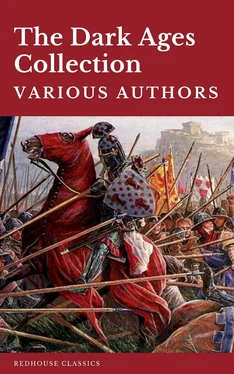Constantia lay in his route, and almost fell into his hands. Here we have a signal example of a secret danger which constantly threatened Roman rule in the Eastern provinces, the disaffection of the Jews. The Jews of Constantia had conspired to deliver the city to the enemy, but the plot was discovered, and the enraged Greeks killed all the Jews they could find. Disappointed of his hope to surprise the fortress, Kavad did not stay to attack it, but moved on to Edessa. He blockaded this city for a few days without success (September 17), and Areobindus sent him a message: “Now thou seest that the city is not thine, nor of Anastasius, but it is the city of Christ who blessed it, and it has withstood thy hosts.” 54But he deemed it prudent to induce the Persians to withdraw by agreeing to pay 2000 lbs. of gold at the end of twelve days and giving them hostages. Kavad withdrew, but demanded part of the payment before the appointed day. When this was refused he returned and renewed the blockade (September 24), but soon abandoned the enterprise in despair.
The operations of the following year were advantageous to the Empire. The evils of a divided command had been realised, Hypatius was recalled, and Celer, the Master of Offices, an Illyrian, was invested with the supreme command. 55He invaded and devastated Arzanene; Areobindus invaded Persian Armenia; Patricius undertook the recovery of Amida. The siege of this place lasted throughout the winter till the following year (A.D. 505). The garrison, reduced to the utmost straits by famine, finally surrendered on favourable terms. The sufferings of the inhabitants are illustrated by the unpleasant story that women “used to go forth by stealth into the streets of the city in the evening or in the morning, and whomsoever they met, woman or child or man, for whom they were a match, they used to carry him by force into a house and kill and eat him either boiled or roasted.” When this practice was betrayed by the smell of the roasting, the general put some of the women to death, but he gave leave to eat the dead. 56
The Romans paid the Persians 1000 lbs. of gold for the surrender of Amida. Meanwhile Kavad was at war with the Ephthalites, and he entered into negotiations with Celer, which ended in the conclusion of a truce for seven years (A.D. 505). 57It appears that the truce was not renewed at the end of that period, but the two empires remained actually at peace for more than twenty years.
It has been justly observed that in these oriental wars the Roman armies would hardly have held their own, but for the devoted loyalty of the civil population of the frontier provinces. It was through their heroic co-operation and patience of hunger that small besieged garrisons were able to hold out. Their labours are written in the remains of the stone fortresses in these regions. 58And they had to suffer sorely in time of war, not only from the enemy, but from their defenders. The government did what it could by remitting taxes; but the ill-usage which they experienced from the foreign, especially the German, mercenaries in the Imperial armies was enough to drive them into the arms of the Persians. Here is the vivid description of their sufferings by one of themselves. 59
“Those who came to our aid under the name of deliverers plundered us almost as much as our enemies. Many poor people they turned out of their beds and slept in them, whilst their owners lay on the ground in cold weather. Others they drove out of their own houses, and went in and dwelt in them. The cattle of some they carried off by force as if it were spoil of war; the clothes of others they stripped off their persons and took away. Some they beat violently for a mere trifle; with others they quarrelled in the streets and reviled them for a small cause. They openly plundered every one’s little stock of provisions, and the stores that some had laid up in the villages and cities. Before the eyes of every one they ill-used the women in the streets and houses. From old women, widows, and the poor they took oil, wood, salt, and other things for their own expenses, and they kept them from their own work to wait upon them. In short they harassed every one both great and small. Even the nobles of the land, who were set to keep them in order and to give them their billets, stretched out their hands for bribes; and as they took them from every one they spared nobody, but after a few days sent other soldiers to those upon whom they had quartered them in the first instance.”
This war taught the Romans the existence of a capital defect in their Mesopotamian frontier. While the Persians had the strong fort of Nisibis against an advance to the Tigris, the Romans had no such defence on their own frontier commanding the high road to Constantia. After the conclusion of the treaty, Anastasius immediately prepared to remedy this weakness. At Daras, close to the frontier and a few miles from Nisibis, he built an imposing fortified town, provided with corn-magazines, cisterns, and two public baths. He named it Anastasiopolis, and it was for the Empire what Nisibis was for Persia. Masons and workmen gathered from all Syria to complete the work while Kavad was still occupied by his Ephthalite war. He protested, for the building of a fort on the frontier was a breach of treaty engagements, but he was not in a position to do more than protest and he was persuaded to acquiesce by the diplomacy and bribes of the Emperor, who at the same time took the opportunity of strengthening the walls of Theodosiopolis. 60
CHAPTER XV: JUSTIN I AND JUSTINIAN I
§ 1. Election and Reign of Justin I (A.D. 518-527)
ANASTASIUS had made no provision for a successor to the throne, and there was no Augusta to influence the election. Everything turned out in a way that no one could have foreseen. The most natural solution might have seemed to be the choice of one of the late Emperor’s three nephews, Probus, Pompeius, or Hypatius. They were men of average ability, and one of them, at least, Pompeius, did not share his uncle’s sympathy with the Monophysitic creed. But they were not ambitious, and perhaps their claims were not seriously urged. 1
The High Chamberlain Amantius hoped to play the part which Urbicius had played on the death of Zeno, and he attempted to secure the throne for a certain Theocritus, otherwise unknown, who had probably no qualification but personal devotion to himself. As the attitude of the Palace guards would probably decide the election, he gave money to Justin, the Count of the Excubitors, to bribe the troops. 2
In the morning (July 9) the people assembled in the Hippodrome and acclaimed the Senate. “Long live the Senate! Senate of the Romans, tu vincas! We demand our Emperor, given by God, for the army; we demand our Emperor, given by God, for the world!” The high officials, the senators, and the Patriarch had gathered in the Palace, clad most of them in mouse-coloured garments, and sat in the great hall, the Triklinos of the Nineteen Akkubita. Celer, the Master of Offices, urged them to decide quickly on a name and to act promptly before others (the army or the people) could wrest the initiative from their hands. But they were unable to agree, and in the meantime the Excubitors and the Scholarians were acting in the Hippodrome. The Excubitors proclaimed John, a tribune and a friend of Justin, and raised him on a shield. But the Blues would not have him; they threw stones and some of them were killed by the Excubitors. Then the Scholarians put forward an unnamed patrician and Master of Soldiers, but the Excubitors would not accept him and he was in danger of his life. He was rescued by the efforts of Justin’s nephew, the candidatus Justinian. The Excubitors then wished to proclaim Justinian himself, but he refused to accept the diadem. As each of these persons was proposed, their advocates knocked at the Ivory Gate, which communicated between the Palace and the Hippodrome, and called upon the chamberlains to deliver the Imperial robes. But on the announcement of the name, the chamberlains refused.
Читать дальше












